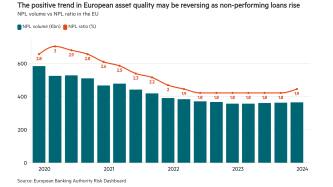It is an irony of Portugal’s financial sector that the bank that derives the biggest share of its income from the domestic market is foreign-owned.
As four of the top five banks endeavour to increase the contribution of overseas operations to their net income – partly to offset weak economic growth at home – Santander Totta, which was acquired by the Spanish Santander group in 2000, achieved the highest return on equity in the sector last year (25.1%). This was from a business that, by the nature of its ownership, is exclusively focused on the Portuguese market.
Totta, the country’s fourth largest bank with a global market share of about 12%, also achieved the lowest cost-to-income ratio (46.2%) of the top five, a 25% increase in net income to €425.2m and a 13.2% increase in operating income, one of the highest in the sector.
This performance, based solely on domestic operations in an economy registering the slowest growth not only in the EU but in all of Europe, highlights the resilience shown by Portuguese banks in the face of a protracted economic downturn and fierce competitive pressure on financial margins.
Strategies for growth
Joaquim Gões, a board member of Banco Espírito Santo (BES), the third largest financial group with a market share approaching 20%, says the sector has successfully implemented three key strategies that have enabled banks to achieve strong growth and improve asset quality, despite economic recession and the country’s recent budget deficit crisis. The three strategies are cost reduction, cross-selling and risk control.
“Banks have invested strongly in reducing costs and taken advantage of new technologies to restructure, centralise and automate back-office operations,” he says.
“They have used internet and telephone banking to cut service costs and have successfully implemented new management techniques to improve efficiency. As a result, Portugal has one of the best performing banking sectors in Europe in terms of cost-to-income ratios.”
Portuguese banks were also early promoters of cross-selling, building on traditional lending and deposit operations to market a wide range of other financial products to their customers, from consumer credit to insurance. BES, for example, currently sells an average of seven products to its more affluent clients and about three-and-a-half to mass-market customers, one of the highest levels in the sector. Mr Gões says there is still strong potential for growth in cross-selling, particularly in the area of investment funds.
Banks have also weathered the economic downturn without any significant deterioration in credit quality. Last year, non-performing loans accounted for less than 1.5% of total lending among the top five banks, with Totta outperforming the field with a score of 0.6%. Banks have consistently implemented sophisticated risk analysis and credit rating systems and ensured sound levels of provision to offset the impact of the weak economy on credit quality.
Role of risk analysis
Paulo Teixeira Pinto, chief executive of Millennium BCP, Portugal’s second largest financial group by loans and deposits, believes risk analysis will become an increasingly decisive factor in assessing performance. “In the future, banks will be characterised more and more not just by their business volume and their profits, but by their risk profile,” he says.
BCP is a leading example of the drive by Portuguese banks to compensate for slow economic growth at home and the limited size of the Portuguese market by expanding overseas.
“Banks in Germany, France, Italy or Spain can expand abroad by following the internationalisation of their domestic companies,” says Mr Teixeira Pinto.
“Portugal doesn’t have the critical mass for that kind of corporate expansion. Instead, BCP has chosen overseas markets where there is strong potential for growth, where we have the know-how to be competitive and where the market is not at a level of maturity that would create too great a barrier to our entry.”
In a first wave of overseas expansion, BCP has focused on Poland and Greece. It is now the sixth largest bank and has the third largest mortgage lending portfolio in Poland, a market four times bigger than Portugal. Its second wave involves operations in Romania, Turkey, the US, Mozambique and Angola.
Angolan launch
Having failed in a 2005 bid to acquire Banca Comerciala Romana, the country’s biggest bank, BCP is opening a new Romanian bank in September and has also launched a green-field operation in Angola.
“I’m not aware of any other European bank that has launched two start-ups in the same year,” says Mr Teixeira Pinto.
BCP’s €4.3bn bid for Banco BPI, Portugal’s fifth largest bank, is also part of its strategy to operate as a ‘multi-domestic’ bank, adopting different market-driven business models specifically designed for each individual economy in which the group operates.
“The bid for BPI should not be seen as a reversal of our strategy in the sense of turning back to the domestic market,” says Mr Teixeira Pinto. “On the contrary, it’s aimed at building a foundation for greater value creation and further overseas expansion.”
Overseas growth
The contribution of overseas operations grew from 3% of BCP’s net income in 2004 to 9% last year. The medium-term target is 33%. More than 40% of the bank’s branches are already outside Portugal, together with more than 8000 employees, compared with just under 11,000 in Portugal. All board meetings are held in English, the group’s lingua franca. “No other Portuguese company has placed so much of its financial assets, logistics and staff outside the country,” says Mr Teixeira Pinto.
BCP’s overseas strategy differs sharply for the approach of most other Portuguese banks. BES, which already gains 22% of its net income from overseas operations and plans to lift this contribution to 35% by 2009, exemplifies the more traditional approach.
“Our strategy is to position ourselves in markets that have strong cultural and economic affinities with Portugal, where being a Portuguese bank can in some way make a difference,” says Mr Gões. For BES and most other Portuguese banks this means Spain, Brazil and Portuguese-speaking Africa.
“That is not our approach,” says Mr Teixeira Pinto. “We choose overseas markets where there is potential for growth and where we can offer something other banks cannot. Our commitment to Angola, for example, is not based on its cultural links with Portugal, but on the fact that it is one of the world’s fastest-growing economies.”
If BCP’s bid for BPI is successful, its green-field project in Angola will benefit strongly. BPI, which owns one of the country’s two leading banks, already derives about 25% of its net income from operations in Angola and Mozambique.
Acquiring BPI would give BCP undisputed leadership of the Portuguese market, with a market share of about 35% of lending and 30% of deposits. It would also lift its market capitalisation from about €10bn to close to €15bn. Analysts say this would provide BCP with strong protection from takeover.
But the offer, which Mr Teixeira Pinto says was intended as a “unilateral merger proposal” rather than a hostile bid, has been firmly and consistently rejected by BPI’s board as “wholly unacceptable”.
“More than a year after the bid was launched, we are more confident than ever that it will fail,” says Fernando Ulrich, BPI’s chief executive.
“Over the past 12 months, BPI has grown bigger, better and stronger. Although we’re a much smaller bank, our total loans and customer resources in Portugal increased by €6bn in 2006 compared to growth of only €4.2bn for BCP,” he says. “We believe in our project, for which we enjoy the firm support of our shareholders.”











